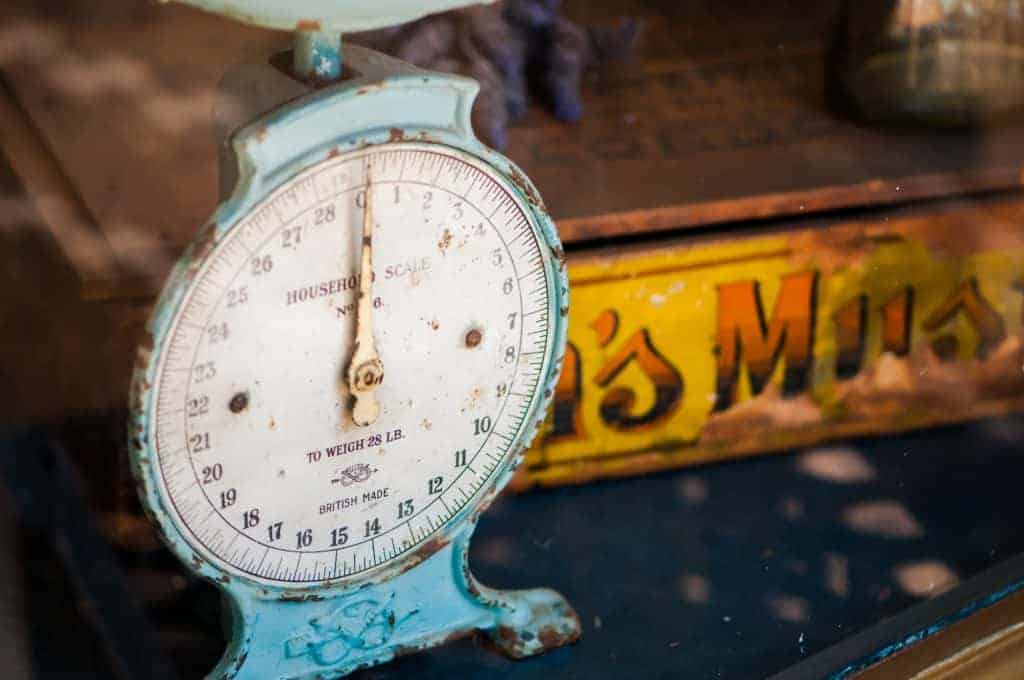Geschatte leestijd: 3 minutenEveryone has their own relationship with the scale. Some people step on it fearlessly every day, casually glancing at the number on the scale, while others avoid the scale, fearing the confrontation with the number. But what does the number on the scale actually mean? And why should you or should you not step on the scale every day? You’ll find out here.

Weegschaal gewicht: wat zegt het getal?
So there are people who prefer to avoid the scale and would rather not weigh themselves. But the problem with the scale is that the number it shows often provides too little insight. After all, what is the number based on? Why does it show the number you read? And why does the number fluctuate daily, weekly, and monthly?
Let’s start by clarifying that every kilo you read, whether it’s water, fat mass, or muscle mass, represents the same unit: one kilo. So a kilo of muscle mass or a kilo of fat mass is still 1 kilo.
Quick test:
What weighs more: 1 kilo of muscle mass or 1 kilo of feathers?
Exactly! They both weigh 1 kilo.
Now that we’ve cleared that up, let’s look at the space that fat mass occupies compared to muscle mass. This density can have a significant impact on how your body looks.
A little explanation: To express mass of specific tissue, we use a volume unit in science, such as cubic centimeters, also abbreviated to CM3. Water weighs 1 gram per cm3, while muscle weighs 1.06 grams per cm3.
The density of muscle mass is greater than that of water, which explains why someone who is muscular with little fat cannot float. Fat mass weighs 0.9 grams per cm3 and would float. In ascending order, it is fat, water, and muscle mass.
So, the scale weight you read can consist of, among other things, water, muscle mass, fat mass, and more, but they will all have different densities, and this can give a different image when you look in the mirror. If you want a better understanding of how your weight is composed, try measuring your body fat percentage as well.
Waarom verschilt het weegschaal gewicht?
The number on the scale can fluctuate significantly. It is therefore important that you know why the number displayed by the scale can differ.
First of all, make sure your scale is properly calibrated. This is especially the case with older models. Ensure that the scale is placed on a flat, even, and hard surface. So, soft carpeting is not optimal, but a hard surface like bathroom tiles is suitable. Also, be aware that there can be differences between scales. So always weigh yourself on the same scale and do not use your friend’s, partner’s, sibling’s, etc., scale. That can give a distorted view.
Weigh yourself always at the same time of day. So, for example, if you wake up and go to the toilet, that’s when you weigh yourself. And preferably step on the scale with as little clothing as possible, so naked, so that the scale weight is only based on your body. And when you weigh yourself, stand still for a moment.
How often should I weigh myself?
You don’t need to weigh yourself every day. It’s really not necessary. Not if you want to gain weight. Not if you want to lose weight. Weighing yourself every day is pointless. Your weight naturally fluctuates by about 1 to 2 kilograms. These fluctuations are mainly due to the amount of fluid in your body. For example, if you’ve had a meal with more salt, your body retains more fluid, and you can be significantly heavier the next day. So if you’ve been to the Italian restaurant and had a delicious pizza, chances are the next day the scale will show a higher number. This extra weight due to extra fluid is often gone after 1 or 2 days. Unless you eat pizza every day, of course.
Weight fluctuates during menstruation
The scale weight in women can also vary greatly around menstruation. Just before menstruation, women can often be 1 to 2 kilograms heavier on the scale than usual. This is also caused by the extra fluid retained by the body. This extra weight is often gone after menstruation, but keep this in mind if you suddenly see fluctuations around your period that you cannot directly trace back.
In addition to menstruation, irregular bowel movements can also affect your weight. So if you have trouble with your bowel movements, that extra baggage in your intestines will also contribute to the scale weight.
Conclusion
As you can see, the scale weight that the number shows is not sacred. The number can vary greatly and does not really say much about how your body is composed. Therefore, there is no need to be afraid of the number on the scale and the scale weight. Body weight and body composition, such as body fat percentage, are different indicators. It’s fine to weigh yourself every 2 or 4 weeks because weight is just one variable in your path to results. But it’s even better to take a progress photo of yourself at the same time, so you can also see how your body composition has changed over the weeks. Together with your weight, your photos, and how you feel, you can best shape the route to success.

